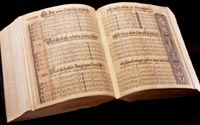Ephrata Community Songbook

|
The principal source for the music of the German Seventh-Day Baptists,
a group that immigrated to Pennsylvania in 1732, this manuscript
is inscribed with a title that unrolls in the full proliferation
of German Pietism: "The Bitter good, or the song of the lonesome
turtledove, the Christian church here on earth, in the valley of
sadness, where it bemoans its `widowhood' and at the same time sings
of another, future reunion [with God]."
Johann Conrad Beissel, founder of the Seventh-Day Baptists, served
not only as spiritual director of the group but also as its composer,
devising his own system of composition. His method is described
in Chapter eight of Thomas Mann's 1947 novel Doktor Faustus:
He decreed that there should be "masters" and "servants"
in every scale . . . And those syllables upon which the accent lay
had always to be presented by a "master," the unaccented by a "servant."
With these rules Beissel set to music the hymn texts of his denomination
(many of which he had written) and large passages of the Bible.
He is said to have hoped to set the entire Bible to music in this
system. In performance his music seems almost willfully awkward
to those accustomed to normal German hymnody--or even to the homegrown
hymntunes of the late-eighteenth-century English-language American
tunesmiths--but the passionate need to express the words of the
text is never in doubt. This style of music declined after the death
of Beissel in 1768.
The group's illuminated musical manuscripts were hand-lettered
in Fraktur and are among the earliest original music composed
in the British colonies. This volume was once in the possession
of Benjamin Franklin, and a note on the flyleaf reads: "April 1775.
This curious book was lent me by Doctor Franklin just before he
set out for Pennsylvania."
|

